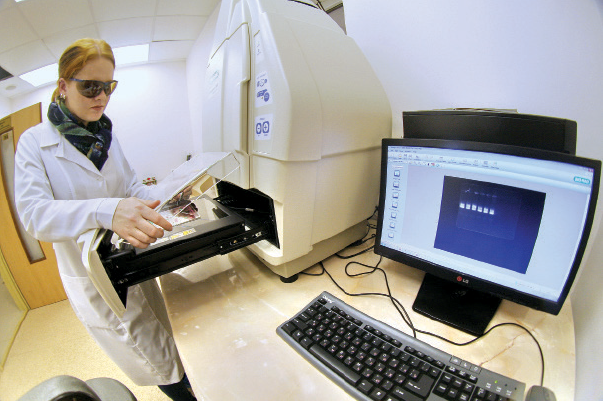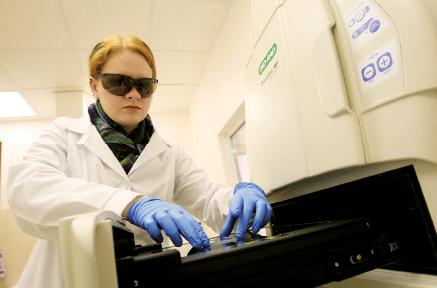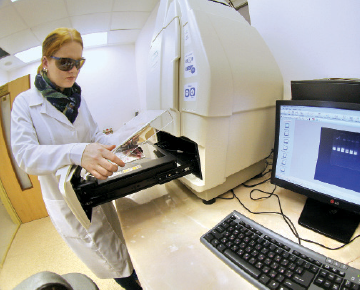The Centre of Analytical and Genetic Engineering Research — one of the departments of the future BelBioGrad — has begun its work at the Institute of Microbiology at the National Academy of Sciences of Belarus. It is an important event, opening new horizons for the development of biotechnologies in our country. It is important that this field is capable of resisting the total chemicalisation of the environment. Considering that about 20 percent of the population of the developed states already suffer from allergies and the WHO calls to move away from preponderance of pesticides and antibiotics in agriculture, it is the most important task. And here we have own groundwork.

Centre equipped with latest scientific equipment for genetic-engineering, molecular-biological and biochemical research
The EurAsEC is already thinking of outlawing antibiotics in the sphere of stockbreeding, but then there arises a question: what will replace them? The Institute of Microbiology can offer ready recipes: five probiotics items were developed. There is also an alternative to pesticides — a means of biological control. Preparations for clearing of air, water, soil and many other things, are being developed. While all of them are practical results of biotechnologies claimed also in medicine, nature protection activity, bio-energetics, and light and food-processing industry and promoting gradual transition to a new level — bioeconomy. It is necessary to say that last year, our biotechnological branch issued production of Br7 trillion, while part of production was delivered for export. Volumes grow, and the big merit in it belongs to the scientifically-practical association of Chemical Synthesis and Biotechnologies which includes Institute of Microbiology.

Centre’s junior research officer Tatiana Kirpicheva
According to the estimations of the Director of the Institute, corresponding member of the NAS, Emilia Kolomiets, a new Centre of Analytical and Genetic Engineering Research will help scientists work at a level of which it was possible only to dream. The equipment is advanced, with chromatograph (gas and high-efficiency liquid), sequenators and DNA amplifiers, where results can be received in real time, and many other things. Generally speaking, the institute now creates the
 whole chain; starting from molecular biology to industrial production. At the end of 2009, the Biotechnological Centre was created and even at a small capacity it annually produces 30 tonnes of preparations, the work is carried out in three changes and the enterprise has already produced Br31 billions of production and 50 new biotechnologies are mastered. These figures are impressive. Emilia Kolomiets is sure that it will be with preparations developed at our institute that our agriculture and other branches will learn what biotechnologies are and what are they capable of. However, without modernisation and a modern approach today, it is impossible to hold out in the market. So the creation of the centre is the necessary next stage. Its equipment will allows receipt high level ferment preparations, probiotics with antivirus and antimicrobic activity preparations, strains for the manufacture of lactic acid and biobutnol (the biofuel of the next generation).
whole chain; starting from molecular biology to industrial production. At the end of 2009, the Biotechnological Centre was created and even at a small capacity it annually produces 30 tonnes of preparations, the work is carried out in three changes and the enterprise has already produced Br31 billions of production and 50 new biotechnologies are mastered. These figures are impressive. Emilia Kolomiets is sure that it will be with preparations developed at our institute that our agriculture and other branches will learn what biotechnologies are and what are they capable of. However, without modernisation and a modern approach today, it is impossible to hold out in the market. So the creation of the centre is the necessary next stage. Its equipment will allows receipt high level ferment preparations, probiotics with antivirus and antimicrobic activity preparations, strains for the manufacture of lactic acid and biobutnol (the biofuel of the next generation).The plans of the Institute of Microbiology are to, in a year or two, to continue the chain, having created base for the industrial production of preparations, the research-and-production centre of biotechnologies. Increase in volume is caused by both internal and external markets. Already now, the Institute’s preparations are requested by Russia, Lithuania and Serbia and are creating interest in China and Turkey.











